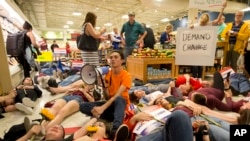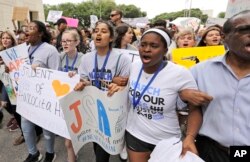More than three months after the school shooting in Parkland, Florida, that left 17 people dead, the survivors who became gun-control activists could determine how the post-millennial generation will be remembered.
“It’s the beginning of something really, really compelling. A new generation of political movement,” says Carolyn Davis of the Public Religion Research Institute, a nonprofit, nonpartisan organization that conducts research on religion, culture and public policy.
“You look at the civil rights movement, you look at the anti-war movement, these are movements led by students, led by young people, so there’s precedence for this," she says, referring to student activism in the 1960s. "Suffrage and the American Revolution in large part were fought by people about this age.”
Last week, Marjory Stoneman Douglas High School senior David Hogg announced a boycott of Publix food stores after learning the grocery chain had contributed money to a pro-NRA Republican candidate for Florida governor. Hogg and other student activists conducted a "die-in," in which students lay on the floor of the grocery store to simulate students killed by gun violence.
By Friday, Publix announced it was halting all political donations.
“This is the beginning of us taking back our democracy and revolutionizing America for the better,” Hogg told VOA at the “March for Our Lives” protest in Washington, D.C., back in March.
On his Twitter social media account, Hogg regularly proclaims, “The young people will win.”
That kind of optimism is a hallmark of the post-millennial generation, according to Davis.
“They’re an optimistic bunch who are getting increasingly civically engaged, increasingly engaged through online social media, but we’re seeing that, as well, translate into an increasing commitment to in-real-life action,” she says.
“People this age are going to start voting in the next few years,” college student Haley Fleming told VOA. “They’ll be voting in the next presidential election and every election after that, and then they’ll start running for Congress and that’s when this movement is really going to take shape.”
That kind of directed, political attitude is typical of post-millennials, according to demographer William Frey of the Brookings Institution.
“They kind of look at the rest of us older people as something to push aside,” Frey says. “Not in a bombastic way, but basically just sort of shrug their shoulders and say, ‘Let’s move on from all of this.’”
Just who is a millennial remains fluid. The Pew Research Center says anyone born from 1997 onward is part of this new generation. The oldest among them turn 21 in 2018. Demographer Frey defines post-millennials as anyone born in 1998 to the present, people aged 20 and below.
This generation has been given several names — Gen Z, Digital Generation, iGeneration and # (hashtag) Generation — but so far nothing has stuck in the same way the term “millennials” has for the generation before them.
And while they don’t have a catchy moniker, post-millennials are already making a name for themselves.
“From what we can see, they’re very liberal, they’re very democratic in terms of their political expectations,” says Frey, who adds that, compared to their own parents or millennials, post-millennials are more liberal — so far. “The tricky thing about post-millennials is they’re not yet fully formed. A lot of people have different attitudes in their teens than they wind up having 10 or 15 years later.”
When it comes to politics, young people are deeply divided along racial lines, according to a recent PRRI study of people between the ages of 15 and 24. About one-third of young white people hold positive views of President Donald Trump, while support for the president among blacks (5%) and Hispanics (17%) in the same age group is significantly lower.
A 2017 survey of college freshmen by the University of California-Los Angeles Higher Education Research Institute said, "political polarization on campuses is the most extreme it has been in study's 51-year history."
The PRRI survey found the most critical issues for young people are jobs and unemployment, terrorism, and the cost of higher education. About half of young women said they’ve signed an online petition, and are also much more likely than young men to donate or volunteer for a group or a cause.
Efforts to increase diversity are viewed favorably across all demographic groups in the 15-to-24 age group, although to a lesser extent among young white men.
"While this is the most diverse generation,” PRRI's Davis says, “there is no guarantee that they’re going to politically be of one mind.”
It’s that diversity that demographer Frey believes will set post-millennials apart in the long run. But Frey doesn’t think America is properly preparing this diverse group of young people for the future. He says investments in this generation are not where they should be.
“We have this kind of cultural generation gap in this country,” he says. For example, he says, some Americans "look at [racial and cultural diversity] and say, ‘Well, they’re not our children, they’re not our grandchildren. These are people who are immigrants. Who are they? The country is changing in ways we don’t like.'"
As the baby boomers — those born between 1946 and 1964 — retire, there will be jobs to fill. But Frey questions whether post-millennials are getting the resources they need to succeed.
“Investment in youth programs and other programs is not what it was during the Baby Boom when there was a lot of effort put into education and student loans, advice about college, there were state and federal grants,” Frey notes. “These days ... those opportunities aren’t as wide as they should be, especially for a very diverse generation.”






